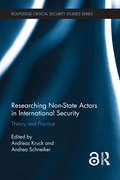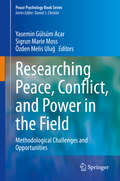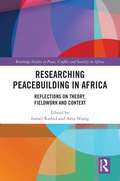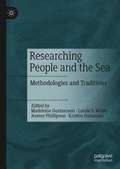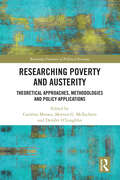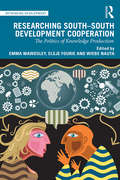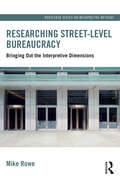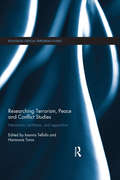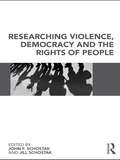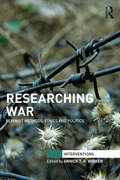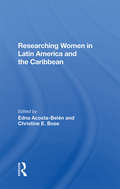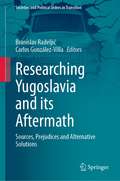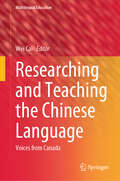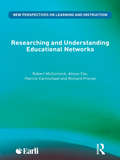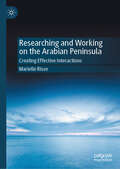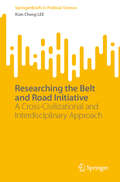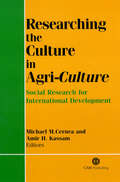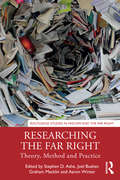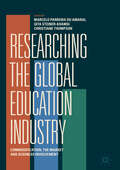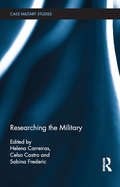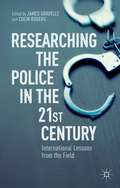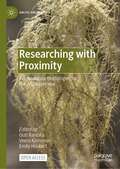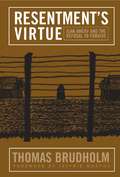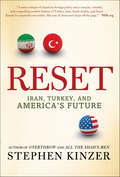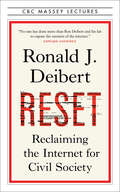- Table View
- List View
Researching Non-state Actors in International Security: Theory and Practice (Routledge Critical Security Studies)
by Andrea Schneiker Andreas KruckThis volume provides researchers and students with a discussion of a broad range of methods and their practical application to the study of non-state actors in international security. All researchers face the same challenge, not only must they identify a suitable method for analysing their research question, they must also apply it. This volume prepares students and scholars for the key challenges they confront when using social-science methods in their own research. To bridge the gap between knowing methods and actually employing them, the book not only introduces a broad range of interpretive and explanatory methods, it also discusses their practical application. Contributors reflect on how they have used methods, or combinations of methods, such as narrative analysis, interviews, qualitative comparative analysis (QCA), case studies, experiments or participant observation in their own research on non-state actors in international security. Moreover, experts on the relevant methods discuss these applications as well as the merits and limitations of the various methods in use. Research on non-state actors in international security provides ample challenges and opportunities to probe different methodological approaches. It is thus particularly instructive for students and scholars seeking insights on how to best use particular methods for their research projects in International Relations (IR), security studies and neighbouring disciplines. It also offers an innovative laboratory for developing new research techniques and engaging in unconventional combinations of methods. This book will be of much interest to students of non-state security actors such as private military and security companies, research methods, security studies and International Relations in general.
Researching Peace, Conflict, and Power in the Field: Methodological Challenges and Opportunities (Peace Psychology Book Series)
by Yasemin Gülsüm Acar Sigrun Marie Moss Özden Melis UluğThis edited volume offers useful resources for researchers conducting fieldwork in various global conflict contexts, bringing together a range of international voices to relay important methodological challenges and opportunities from their experiences. The book provides an extensive account of how people do conflict research in difficult contexts, critically evaluating what it means to do research in the field and what the role of the researcher is in that context. Among the topics discussed:Conceptualizing the interpreter in field interviews in post-conflict settingsData collection with indigenous peopleChallenges to implementation of social psychological interventionsResearching children and young people’s identity and social attitudesInsider and outsider dynamics when doing research in difficult contextsWorking with practitioners and local organizations Researching Peace, Conflict, and Power in the Field is a valuable guide for students and scholars interested in conflict research, social psychologists, and peace psychologists engaged in conflict-related fieldwork.
Researching Peacebuilding in Africa: Reflections on Theory, Fieldwork and Context (Routledge Studies in Peace, Conflict and Security in Africa)
by Ismail Rashid and Amy NiangThis book examines the multifaceted nature of conflict and the importance of the socio-economic and political contexts of conflict and violence and shows how to support ongoing initiatives and programs to build sustainable peace on the African continent. Drawing on a range of conceptual framings in the study of peace and conflict, from gender perspectives to institutionalist to decolonial perspectives, the contributors show how peacebuilding research covers a whole range of questions that go beyond concerns for post-conflict reconstruction strategies. Chapters focus on the methodological, theoretical and practical aspects of peacebuilding and provide a toolbox of perspectives for conceptualizing and doing peacebuilding research in Africa. Anchored in African-centered perspectives, the book encourages and promotes high-quality interdisciplinary research that is conflict-sensitive, historically informed, theoretically grounded and analytically sound. This book will be of benefit to scholars, policy makers and research institutions engaged in peacebuilding in Africa.
Researching People and the Sea: Methodologies and Traditions
by Madeleine Gustavsson Carole S. White Jeremy Phillipson Kristen OunanianIn this unique edited collection, social scientists reflect upon and openly share insights gathered from researching people and the sea. Understanding how people use, relate to and interact with coastal and marine environments has never been more important, with social scientists having an increasingly vital contribution to make. Yet practical experiences in deploying social science approaches in this field are typically hidden away in field notes and unpublished doctoral manuscripts, with the opportunity for shared learning that comes from doing research often missed. There is a need for reflection on how social science knowledge is produced. This collection presents experiences from the field, its necessary reflexivity and innovation in methods, and the challenges and opportunities of translating across disciplines and policy. It brings to light the tacit expertise needed to study people and the sea and offers lessons which readers could employ in their own research. With a focus on the future direction of marine social sciences, the volume is highly relevant to masters and doctoral students and more experienced researchers engaged in studying people and the sea, as well as policy makers, practitioners and scientists wishing to understand the social dimension of marine and coastal environments. Chapters 2 and 3 are available open access under a Creative Commons Attribution 4.0 International License via link.springer.com.
Researching Poverty and Austerity: Theoretical Approaches, Methodologies and Policy Applications (Routledge Frontiers of Political Economy)
by Caroline Moraes Morven G. McEachern Deirdre O’LoughlinPoverty is a complex global challenge rooted in intertwined social, economic and political factors, which excludes people from participating fully in normalised social and market-based activities. The COVID-19 pandemic has exacerbated poverty-related issues such as food insecurity, and growing numbers of people are having to rely on welfare assistance. This pandemic, coupled with austerity measures implemented across many European countries over the past years, has impacted negatively on towns, cities, regions and countries, leaving places and communities depleted. This edited volume curates a collection of relevant research addressing the challenges of poverty and the political-economic measures that perpetuate it. It adopts a cross-disciplinary approach to covering relevant theories, methodologies and policy-oriented research, highlighting the interlinkages between poverty and austerity that have resulted since the 2008 financial crisis. In particular, the book focuses on food insecurity as one of the most extreme manifestations of poverty but also addresses interconnected issues such as unemployment, homelessness and poor health. The contributors primarily utilise diverse qualitative methods that give voice to lived experiences of poverty while also considering quantitative approaches that are essential for measuring food insecurity and modelling the impacts of austerity. The book will be of significant interest to anyone researching poverty and austerity with an interest in social policy, human and cultural geography, marketing and consumer culture, economic policy, public health and sustainability.
Researching South-South Development Cooperation: The Politics of Knowledge Production (Rethinking Development)
by Emma Mawdsley Elsje Fourie Wiebe NautaOver the last two decades the expanding role of Southern countries as development partners has led to tectonic shifts in global development ideas, practices, norms and actors. Researchers are faced with new questions around identity, power and positionality in global development. Researching South-South Development Cooperation examines this rapidly growing and complex phenomenon, asking to what extent existing assumptions, conceptual frameworks and definitions of 'development' need to be reframed in the context of researching this new landscape. This interdisciplinary book draws on voices from across the Global South and North to explore the epistemological and related methodological challenges and opportunities associated with researching South-South development cooperation, asking what these trends mean for the politics of knowledge production. Chapters are interspersed with shorter vignettes, which aim to share examples from first-hand participation in and observation of South-South development cooperation initiatives. This book will be of interest to anyone conducting research on development in the Global South, whether they are a practitioner or policy maker, or a student or researcher in politics, international development, area studies, or international relations.
Researching Street-level Bureaucracy: Bringing Out the Interpretive Dimensions (Routledge Series on Interpretive Methods)
by Mike RowePolice officers, social workers, teachers, and many other street-level bureaucrats exercise discretion in dealing with clients. In so doing, they make policy as it is experienced at the frontline. Instead of puzzling at repeated public policy implementation failures and wondering why street-level bureaucrats (SLBs) don’t behave the way policy-makers expect, we need to understand the world as seen from the ground. This short and practical text explores the value of interpretive analysis for researching street-level bureaucracy.Using Michael Lipsky’s (1980) idea of SLB and connecting it to contemporary debates, Mike Rowe argues for an approach to researching SLBs that focuses on dilemmas in practice, ones that change with each policy shift, each new target, with austerity, and with new technology such that no settled state is likely. He places emphasis on the need to understand the ways SLBs respond to pressures in order to work with them and to understand what policy becomes in practice. Street-level bureaucrats and their clients are engaged in a process of sense-making.Researching Street-level Bureaucracy is not just an essential resource for teachers and students of Master's and Doctoral programs in Public Administration, Public Policy, Social Work, and Criminal Justice, it is a must-read for anyone interested in understanding the structural pressures that bear on the individual and how any change to the dilemmas confronted might play out at the street-level.
Researching Terrorism, Peace and Conflict Studies: Interaction, Synthesis and Opposition (Routledge Critical Terrorism Studies)
by Ioannis Tellidis Harmonie TorosThis book examines potential synergies between the fields of Terrorism Studies and Peace and Conflict Studies. The volume presents theoretically- and empirically-informed contributions, which shed light on whether the two fields can inform each other on issues of mutual interest and importance. The book examines key themes including the conceptualisation(s) of peace and violence; the exceptionalisation of terrorist violence; the relationship between scholarship and political power; the dysfunctionality of the liberal peace and the opportunities offered by post-liberal peacebuilding frameworks; and the implications and challenges of cyber-terrorism and cyber-conflict. Furthermore, the book intends to be a launching pad for future debate on whether the recent 'critical' turn in terrorism studies can offer a pathway for peace studies to engage with the so far largely ignored question of power. Consisting of not only key scholars but also practitioners and policy makers, the contributors present a number of case studies, including Colombia, Northern Ireland, the Basque Country, and Iraq, where they explore the relationships between terrorism and peace and conflict approaches. They critically analyse the statist approach inherent in both terrorism approaches and liberal peacebuilding frameworks; the role of the grassroots levels of society; the inefficiency of simplistic frameworks of understanding and implementation; and the chains of governance from international (and transnational) actors to national actors and finally from national to local actors. This book will be of much interest to students of terrorism studies, peace and conflict studies, IR and security studies.
Researching Violence, Democracy and the Rights of People
by John F. SchostakViolence, democracy and rights are issues that are not fully addressed in research methodology literatures, yet violence is of vital interest in substantive and theoretical debates across the social sciences, education, philosophy, politics and cultural studies. Methodology needs to be informed by, and be relevant to, the debates and practices within and across these perspectives on the worlds of everyday life. Research is fundamentally entwined with the political, the ethical and the legal. When it presumes the neutrality of method and ignores its radical roots of inquiry, it is in danger of being politically co-opted and ethically naïve. Research that reveals what is at stake politically, ethically and legally is typically open to accusations of being partisan and therefore political. It cannot avoid being political in the broadest sense of the word, and consequently the researcher cannot escape – through some mystical notion of being ‘objective’ – the political, ethical and legal consequences of undertaking research. Research is vital to the construction of public spaces for debate, decision making and action. Hence, there is a close relationship between methodological practices, research design and the conditions under which violence, democracy and rights can be addressed. Researching Violence, Democracy and the Rights of People explores what is at stake methodologically (both theoretically and practically) for researchers seeking to expand opportunities for people to become visible upon the public stages of debate, decision making and action, and thus make audible their experiences of wrongs and injustices, express their rights, and engage democratically in processes of change. Drawing on international contributions and contexts, this book introduces readers to the complex realities of real research and the substantive issues that their methodological approaches strive to deal with. It will benefit undergraduate and postgraduate students as well as post-doctoral and experienced researchers across a range of cultural and social science disciplines, as well as educational and sociological researchers. Its aim is to explore and contribute to the development of innovatory approaches to engaging in research that make a difference in the lives of people.
Researching War: Feminist Methods, Ethics and Politics (Interventions)
by Annick T.R. WibbenResearching War provides a unique overview of varied feminist contributions to the study of war through case studies from around the world. Written by well-respected scholars, each chapter explicitly showcases the role of feminist methodological, ethical and political commitments in the research process. Designed to be useful for teaching also, the book provides insight into feminist research practices for students and scholars wanting to further their understanding what it means to study war (and other issues) from a feminist perspective. To this end, every author follows a four-part structure in the presentation of their case study: outlining a research puzzle, explaining the chosen approach, describing the findings and, finally, offering a reflection on the feminist commitments that guided the research. This book: Provides a multi-disciplinary perspective on war by drawing on disciplines such as anthropology, history, literature, peace research, postcolonial theory, queer studies, security studies, and women’s studies; Showcases a multiplicity of experiences with war and violence, emphasizing everyday experiences of war and violence with accounts from around the world; Challenges stereotypical accounts of women, violence, and war by pointing to contradictions and unexpected continuities as well as unexpected findings made possible by adopting a feminist perspective; Teases out linkages between various forms of political violence (against women, but increasingly also by women); Discusses theoretical and methodological innovation in feminist research on war. This book will be essential reading for advanced students and scholars of Security Studies, Gender and Conflict, Women and War, Feminist International Relations and Research Methods.
Researching Women In Latin America And The Caribbean
by Edna Acosta-belen Christine E. BoseThis volume represents more than just a collection of chapters and bibliographic sources. For us, it provides another example of collective solidarity, hard work, and a relentless commitment to contribute to the process of advancing and transforming knowledge about women's condition. It attempts to update and assess how scholarship on women has impacted different disciplines and fields and examines the multivariate conditions and responses to immediate and long-term realities generated by women from different LatinAmerican and Caribbean countries. The editors hope that this publication, modest as it may be, will be a useful tool to other researchers, educators, and students in their efforts at pursuing and expanding the knowledge and visions that will make our different societies more just and liberating for all their citizens.
Researching Yugoslavia and its Aftermath: Sources, Prejudices and Alternative Solutions (Societies and Political Orders in Transition)
by Branislav Radeljić Carlos González-VillaIn Researching Yugoslavia and its Aftermath, a common thread is the authors’ path through the time and space context in which fieldwork has taken place. Accordingly, this collection tackles problems that have always existed but have not been dealt with in a single volume. In particular, it examines a range of methodological questions arising from the contributors’ shared concerns, and thus the obstacles and solutions characterising the relationship between researchers and their objects of study. Being an interdisciplinary project, this book brings together highly regarded historians, sociologists, anthropologists, political scientists, cultural and social theorists, as well as experts in architecture and communication studies. They share a belief that the awareness of the researcher’s own position in fieldwork is a precondition of utmost significance to comprehend the evolution of objects of study, and hence to ensure transparency and ultimate credibility of the findings. Moreover, the contributors come from diverse backgrounds, including authors from the former Yugoslavia and others who have made their way to the region after starting their research careers; some from universities in the area, others from institutions in the Global North. Here, they explore cross-cutting issues such as the repercussions of gender, nationality, institutional affiliation and the consequences of their entry into the field. This is examined in terms of the results of the research and the ethical aspect of the relationship with the object of study, as well as the implications of the chosen time framework in the methodological design and the clash between this decision and the interests of the actors studied.
Researching and Teaching the Chinese Language: Voices from Canada (Multilingual Education #47)
by Wei CaiThis book offers an in-depth exploration of the unique landscape of Chinese language learning and teaching in Canada. It is the first to highlight the distinctive features of Chinese language education in the country and to introduce the Canadian approach to teaching and researching Chinese language, termed the "Canadian school of Chinese education." This approach, largely unfamiliar to the global academic community, is illuminated in this book, filling a critical gap in the literature and providing a platform for Canadian voices and perspectives in the field. The book delves into original and under-investigated areas, addressing important issues in Chinese teaching and learning that require more sophisticated research approaches due to advancements in our understanding and the discovery of complex Chinese learner populations. Structured into four sections, the book offers an overview of Chinese language education in Canada, examines comparisons of learning conditions, explores interactive dynamics and communication strategies, and delves into social and cultural dimensions. This book will be invaluable to researchers, instructors, advanced-level undergraduate students, and graduate students in the field of Chinese language learning and teaching.
Researching and Understanding Educational Networks (New Perspectives on Learning and Instruction)
by Robert McCormick Patrick Carmichael Alison Fox Richard ProcterIn the twenty-first century, what could be more important than networks? Such is the power of their influence and attendant technologies that it is unsurprising that our thinking about networks is permeated with images and metaphors from electronic networks. This orientation may equally influence thinking about education, whether that is of students or teachers. Researching and Understanding Educational Networks extends the discussion of educational networks in a unique and novel way by relating it to teacher learning. Following an investigation of teacher and school networks in the UK, the authors found that theoretical perspectives taken from existing work on such networks were not adequate to provide an understanding of their potential, nor to provide the basis for researching them in ways that reflected the variety of teacher experience. This book presents analyses of the problems with existing theories of teacher learning, which for example draw on ideas of 'communities of practice', and explores what network theories can be brought to the problem of how teachers and schools create and share new knowledge about practice. Innovative networking theories discussed include: social network analysis social capital theories actor-network theory investigations of electronic networks including computer-meditated conferencing how people learn at events such as conferences. Researching and Understanding Educational Networks explores a new application of networks theories derived from quite different fields of work, and extends it both by being concerned about networks beyond organisations and specifically about educational networks. Their application to educational networks, and to teacher learning in particular, is a unique contribution of the book. This enables it to be of interest to both researchers and those studying for higher degrees, including students who are professionals working in schools.
Researching and Working on the Arabian Peninsula: Creating Effective Interactions
by Marielle RisseThis book outlines strategies for current or soon-to-be business professionals, government employees, researchers and teachers to communicate, study and work effectively on the Arabian Peninsula. Using first-person accounts, as well as scholarly research from the fields of history, anthropology, political science, travel writing and literature, this book gives clear advice for expats wanting to create successful interactions with people from Arabian Peninsula societies. By discussing how the practicalities of work and research intersect with cultural norms, this book fills the gap between tourist guides aimed at the causal tourists and academic texts on narrowly defined topics.
Researching the Belt and Road Initiative: A Cross-Civilizational and Interdisciplinary Approach (SpringerBriefs in Political Science)
by Kian Cheng LEEThis book offers a cross-civilizational and interdisciplinary approach to the Belt and Road Initiative (BRI) research to mitigate the problematiques of extant literature. Instead of employing conventional lenses of geo-political, geo-economic and geo-strategic analyses that are predominant, this book offers fresh perspectives that venture into other civilizational and disciplinary territories while critically seeking integration without falling into romanticizing or essentializing any notions. Due to epistemic inadequacies and other conceptual limitations of existing approaches, this book argues that a heuristic framework drawing from the negotiation between Western and Chinese perspectives as well as integration of anthropological-international relations conceptualizations can provide greater potency in unravelling the intricacies of BRI studies. This book is a timely contribution to the ameliorating of the rising tensions between US and China over the recent years. An interdisciplinary toolkit for researchers in BRI-related research, as well as those in government organizations, policy-making bodies, think-tanks, trade and industry sectors, the book presents a paradigmatic shift from a predominantly hegemonic Western thinking about the BRI and its role in the region, and within academic dialogue.
Researching the Culture in Agri-culture: Social Research for International Development
by Michael M. Cernea Amir H. KassamIn September 2002, social scientists attended an international conference in Cali, Columbia organized by the Consultive Group on International Agriculture Research. Papers considered the best were selected, and have been joined by others from scholars outside the Group's network to provide a snapshot of social research in such areas as agriculture, forestry, fisheries, land and water management, and related development policy. The resulting 22 contributions look not only at the knowledge, behavior, and values of practitioners, but also at the institutional structures within which both agriculture and research on it operate. Annotation ©2006 Book News, Inc. , Portland, OR (booknews. com)
Researching the Far Right: Theory, Method and Practice (Routledge Studies in Fascism and the Far Right)
by Edited by Stephen D. Ashe, Joel Busher, Graham Macklin and Aaron WinterResearching the Far Right brings together researchers from across the humanities and social sciences to provide much needed discussion about the methodological, ethical, political, personal, practical and professional issues and challenges that arise when researching far right parties, their electoral support, and far right protest movements.Drawing on original research focussing mainly on Europe and North America over the last 30 years, this volume explores in detail the opportunities and challenges associated with using ethnographic, interview-based, quantitative and online research methods to study the far right. These reflections are set within a wider discussion of the evolution of far right studies from a variety of disciplinary viewpoints within the humanities or the social sciences, tracing the key developments and debates that shape the field today. This volume will be essential reading for students and scholars with an interest in understanding the many manifestations of the far right and cognate movements today. It also offers insight and reflection that is likely to be valuable for a wider range of students and scholars across the humanities and social sciences who are carrying out work of an ethically, politically, personally, practically and professionally challenging nature.
Researching the Global Education Industry: Commodification, the Market and Business Involvement
by Christiane Thompson Marcelo Parreira do Amaral Gita Steiner-KhamsiThis book examines how the Global Education Industry (GEI) has brokered, funded, and implemented new conceptualizations of ‘good’ education. With a focus on new private providers and policy actors in education, the authors of the book analyze the impact of the GEI on educational research, policy and practice. How did philanthropies and foundations manage to make their voices heard in school reform debates, what are the implication of digital technologies and data infrastructures on teaching and learning, and should the fast advance of the GEI be merely seen as a logical consequence of the commercialization of education? Moving beyond single-country case studies, the book focuses on key issues related to the study of the Global Education Industry in an international context, discussing the rationales, processes and impacts of current developments. This comprehensive book will be of interest and value to scholars and researchers of the GEI, as well as policy makers.
Researching the Military (Cass Military Studies)
by Helena Carreiras Celso Castro Sabina FredericResearching the Military focuses on the experiences of researchers who study the military around the world. It explores the historical, social, institutional and personal factors that frame research and scrutinize the way knowledge in this area impacts society and policy. More than merely analyzing research experiences (yet necessarily including them), it is also about the experiences of researchers, their position with regard to the object of their studies, the institutional context where they work and the way their research impacts the academic and policy-making fields in the respective countries. The common theme to the various chapters is reflexivity, a conscious effort at addressing the conditions of research and the position of the researcher and the research participants in that interface. By collecting diverse experiences of researchers from across the world, this volume aims to enhance reflexivity in the field of military studies and to encourage the exchange of knowledge between the academic field and the military arena. This book will be of much interest to students of military studies, research methods, sociology, social anthropology and security studies, in general.
Researching the Police in the 21st Century
by Colin Rogers James GravelleThe unique position, power and privileges which various states and communities invest in police organisations makes policing a dynamic and sensitive area for research. The distinctive culture that exists within the police services makes the challenge of research greater, nevertheless offering commentators and researchers a rare opportunity to investigate and get close to these powerful institutions. This collection explores the importance of undertaking police research, focusing on the difficulties that may be encountered whilst carrying out research of this nature. Using real-life examples from around the world including the USA, UK and Germany, this volume takes a uniquely practical approach to police research, offering valuable solutions and reflections to assist police researchers and undergraduate and postgraduate students in overcoming the barriers which may be experienced whilst undertaking research and providing an essential guide for best practice in this field.
Researching with Proximity: Relational methodologies for the Anthropocene (Arctic Encounters)
by Emily Höckert Outi Rantala Veera KinnunenThis open access book presents a series of speculative, experimental modes of inquiry in the present times of environmental damage that have come to be known as the age of the Anthropocene. Throughout the book authors develop more nuanced ways of engaging with the environmentally vulnerable Arctic. They counter distancing, exoticising, and even apocalyptic imaginaries of the Arctic by staying proximate with mundane places and beings of the north. The volume engages and plays with familiar tourism concepts, such as hospitality, visiting, difference, care, openness, and distance, while expanding the focus from binary and human-centric approaches of hosts and guests to questions of wellbeing among multispecies communities. The transdisciplinary group of contributors share a curiosity about how staying proximate may provide theoretical depth and epistemological openings to attend to current tensions and to diversify the ways we do and enact research. Thus, each chapter provides a methodological experiment with proximity, developing diverse ways of envisioning and storying more-than-human worlds.
Resentment's Virtue: Jean Amery and the Refusal to Forgive
by Thomas BrudholmMost current talk of forgiveness and reconciliation in the aftermath of collective violence proceeds from an assumption that forgiveness is always superior to resentment and refusal to forgive. Victims who demonstrate a willingness to forgive are often celebrated as virtuous moral models, while those who refuse to forgive are frequently seen as suffering from a pathology. Resentment is viewed as a negative state, held by victims who are not "ready" or "capable" of forgiving and healing. Resentment's Virtue offers a new, more nuanced view. Building on the writings of Holocaust survivor Jean Améry and the work of the South African Truth and Reconciliation Commission, Thomas Brudholm argues that the preservation of resentment can be the reflex of a moral protest that might be as permissible, humane or honorable as the willingness to forgive. Taking into account the experiences of victims, the findings of truth commissions, and studies of mass atrocities, Brudholm seeks to enrich the philosophical understanding of resentment.
Reset: Iran, Turkey, and America's Future
by Stephen KinzerThe bestselling author of Overthrow offers a new and surprising vision for rebuilding America's strategic partnerships in the Middle East What can the United States do to help realize its dream of a peaceful, democratic Middle East? Stephen Kinzer offers a surprising answer in this paradigm-shifting book. Two countries in the region, he argues, are America's logical partners in the twenty-first century: Turkey and Iran.Besides proposing this new "power triangle," Kinzer also recommends that the United States reshape relations with its two traditional Middle East allies, Israel and Saudi Arabia. This book provides a penetrating, timely critique of America's approach to the world's most volatile region, and offers a startling alternative.Kinzer is a master storyteller with an eye for grand characters and illuminating historical detail. In this book he introduces us to larger-than-life figures, like a Nebraska schoolteacher who became a martyr to democracy in Iran, a Turkish radical who transformed his country and Islam forever, and a colorful parade of princes, politicians, women of the world, spies, oppressors, liberators, and dreamers. Kinzer's provocative new view of the Middle East is the rare book that will richly entertain while moving a vital policy debate beyond the stale alternatives of the last fifty years.
Reset: Reclaiming the Internet for Civil Society
by Ronald DeibertIn the 2020 CBC Massey Lectures, bestselling author and renowned technology and security expert Ronald J. Deibert exposes the disturbing influence and impact of the internet on politics, the economy, the environment, and humanity. Digital technologies have given rise to a new machine-based civilization that is increasingly linked to a growing number of social and political maladies. Accountability is weak and insecurity is endemic, creating disturbing opportunities for exploitation. Drawing from the cutting-edge research of the Citizen Lab, the world-renowned digital security research group which he founded and directs, Ronald J. Deibert exposes the impacts of this communications ecosystem on civil society. He tracks a mostly unregulated surveillance industry, innovations in technologies of remote control, superpower policing practices, dark PR firms, and highly profitable hack-for-hire services feeding off rivers of poorly secured personal data. Deibert also unearths how dependence on social media and its expanding universe of consumer electronics creates immense pressure on the natural environment. In order to combat authoritarian practices, environmental degradation, and rampant electronic consumerism, he urges restraints on tech platforms and governments to reclaim the internet for civil society.
